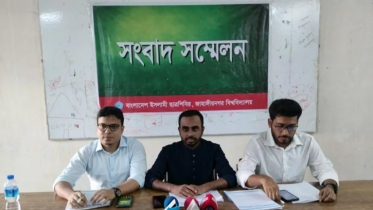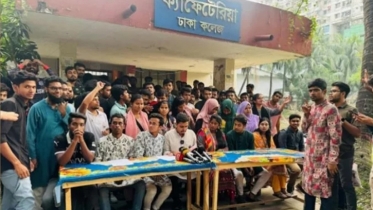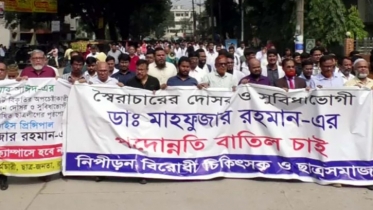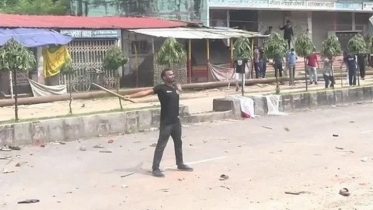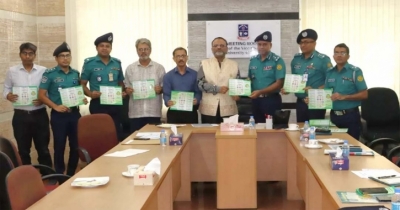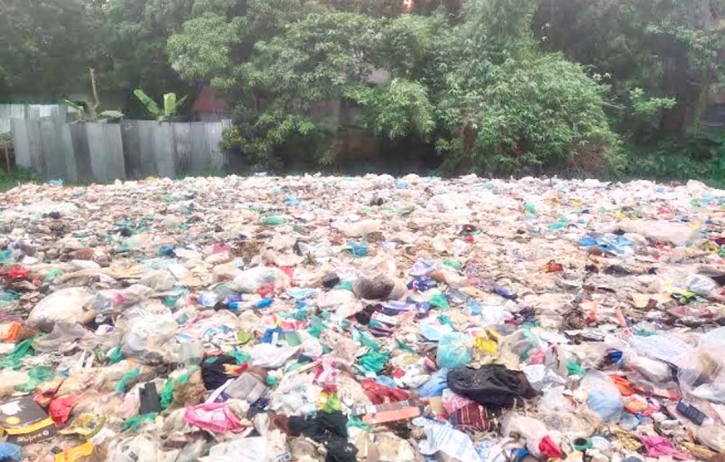
Jahangirnagar University(JU), renowned for its scenic beauty and lush green campus, is grappling with a severe waste management crisis that threatens the environment and the health of dormitory students, teachers, and nearby residents.
Despite its picturesque setting, the JU campus is marred by scattered heaps of waste and debris almost everywhere, leading to land, water, and air pollution. The situation is exacerbated by the university administration's procrastination, which has resulted in an insufficient workforce and inadequate wages for waste management.
During a university visit, it was discovered that behind Mir Mosharraf Hossain Hall, Mowlana Bhashani Hall, Sheikh Russell and Al-Beruni Hall, garbage has accumulated and is scattered, with no disposal system in place. Consequently, the area has gradually transformed into an unofficial waste plant over the years. The accumulation of garbage around the university ponds and reservoirs,coupled with the proliferation of water hyacinths, further exacerbates environmental concerns.
The university's sole waste management plant, staffed by a meager workforce of four, is inefficient in handling the campus's waste. According to Shahinur, a worker at the waste management plant who spoke to The South Asian Times, the current workforce of four is insufficient for effectively collecting garbage from the campus. He stressed the need for at least three more workers to adequately manage waste collection. Shahinur emphasized that with the recruitment of three additional workers, they would be able to efficiently gather all the garbage from the campus and process it at the recycling plant. Shahinur also expressed concern that they are paid very little — it's tough to survive with the current wages.
While residents of Rangamati, a locality adjacent to the waste management plant where university staff reside, are bearing the worst consequences of the crisis, suffering from health issues and environmental degradation.
MD Jahangir Alam, a university staff member of the law department and resident of Rangamati, expressed grave concerns about the pollution's impact on his family's health and quality of life. Jahangir spoke out about the situation, stating, "We can't live here because of the toxic odor from this garbage plant. My two-year-old child is suffering from asphyxia, fever, and cold as a result of this pollution." He also mentioned the mosquito problem caused by the garbage plant, making it impossible to sit peacefully in their houses for even five minutes. Additionally, when it rains, the situation worsens, with the toxic odor intensifying and debris flying into their homes due to heavy winds.Despite repeated complaints to the university administration, residents have seen no action taken to address the issue. In response, they are planning a human chain protest to demand immediate action, either the removal of the waste management plant or comprehensive steps to mitigate its adverse effects.
Deputy Registrar Mohammad Azimuddin and Registrar Abu Hasan provided conflicting statements regarding the crisis.
Deputy Registrar Mohammad Azimuddin, the coordinator of waste management, has expressed concern over the current inadequacy in garbage and debris collection on campus, stating that only five workers are currently tasked with the job, which he deems insufficient. According to him, at least 10-12 workers are required to complete these tasks effectively. He highlighted that despite multiple complaints, including written ones, to the university administration regarding the shortage of workers, no action has been taken. He expressed his frustration, stating that he now finds himself powerless to effect any further change.
In this regard, Abu Hasan, the registrar of the university, spoke to The South Asian Times, "Azimuddin doesn't know anything. Workforce has been increased for the waste management plant. Soon we will also hold a meeting regarding the waste management crisis and take comprehensive steps to mitigate the side effects of the waste management plant."
Deputy Registrar Azimuddin further spoke with The South Asian Times, and gave a conflicting statement compared to registrar Abu Hasan and said, “Registrar is the one who doesn't know anything about the issue. No more workers have been recruited to the waste management plant. Only five workers are working. Yes, recently 2-3 sweepers have been recruited to the estate department, but not for the waste management plant. We have formally noticed him four times for recruiting new workers. But no steps have been taken until now. Even the workers are paid less. They only receive 12,000 to 15,000 taka, whereas their fair wage is 20,000 to 25,000 taka.”
Ultimately, the waste management crisis at Jahangirnagar University demands urgent intervention from the administration to safeguard not only the environment but also the health and well-being of its students, faculty, and surrounding community. Immediate action is imperative to address the pressing issues of pollution, inadequate waste management infrastructure, and fair treatment of workers. Failure to act swiftly could result in irreversible damage to the campus ecosystem and further detriment to the local community.

